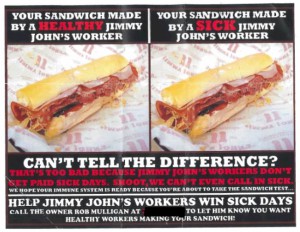Can You Tell the Difference Between Protected & Unprotected Activity?
April 13, 2016 by Sheila Sexton
Unions and their advocates have been fighting nationwide for paid sick leave, with California implementing a new leave law in 2014. In Minnesota, there is no paid sick leave law – yet – but one group of sandwich-shop-franchise employees campaigned for paid sick leave through a creative poster campaign:
The campaign caught the attention of store management, who walked the streets to pull down the posters and encouraged employees to join their removal efforts. Management also fired the workers responsible for the “Union Sick Days” campaign. These workers responded by filing an unfair labor practice charge with the National Labor Relations Board. The NLRB issued a complaint asserting the campaign poster was protected and thus that the termination of the employees for circulating the poster was unlawful.
There was no dispute that the “Union Sick Days” campaign was part of a legally protected employee organizing campaign, but the employer argued the posters were so disloyal, reckless or maliciously untrue as to lose the protection of federal labor law. The Board rejected the employer’s defense, and now so has the 8th Circuit Court of Appeals. Click here to download the decision.
To lose the labor law protection under the “disloyalty” doctrine, conduct must be divorced from a labor dispute. The “Union Sick Days” sandwich posters were unquestionably related to and a very effective part of a campaign to improve working conditions and thus, did not constitute “disloyalty,” such that the legal protection was lost.
The law’s protection can also be lost if activity is deemed to be recklessly or maliciously untrue. The employer lost on this defense, too. When the campaign began, the employer had no paid sick days, required employees to find their own replacements if they needed to take an unpaid sick day, and the employees were subject to discipline for taking unpaid sick days. As a consequence, a large majority of the employer’s workers reported having worked while sick. Plus, the employer’s stores had been the subject of at least two food poisoning incidents, the telling of which can turn stomachs years later.
These workers, who now must be offered reinstatement and full back pay, deserve our congratulations for their creative campaign and their years’ long struggle for full vindication of their rights.
The material on this website is provided by Beeson, Tayer & Bodine for informational purposes only and does not constitute legal advice. Readers should consult with their own legal counsel before acting on any of the information presented. Some of the articles are updated periodically, and are marked with the date of the last update. Again, readers should consult with their own legal counsel for the most current information and to obtain professional advice before acting on any of the information presented.
